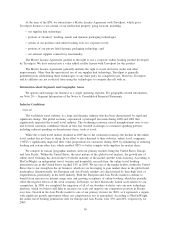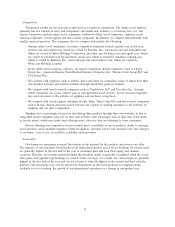Orbitz 2010 Annual Report Download - page 20
Download and view the complete annual report
Please find page 20 of the 2010 Orbitz annual report below. You can navigate through the pages in the report by either clicking on the pages listed below, or by using the keyword search tool below to find specific information within the annual report.risks associated with inadequate maintenance or upgrading, our information technologies and systems are
vulnerable to damage or interruption from various causes, including:
• natural disasters, war and acts of terrorism;
• power losses, computer systems failure, Internet and telecommunications or data network failures,
operator error, losses and corruption of data, and similar events;
• computer viruses, penetration by individuals seeking to disrupt operations or misappropriate information
and other physical or electronic breaches of security; and
• the failure of third-party systems or services that we rely upon to maintain our own operations.
We do not have backup systems for certain critical aspects of our operations. For example, if we were
unable to connect to certain third-party systems, such as GDSs, due to failure of our systems, our ability to
process bookings could be significantly or completely impaired. Many other systems are not fully redundant,
and our disaster recovery planning may not be sufficient. In addition, we may have inadequate insurance
coverage or insurance limits to compensate for losses from a major interruption, and remediation may be
costly and have a material adverse effect on our operating results and financial condition. Any extended
interruption in our technologies or systems could significantly curtail our ability to conduct our businesses and
generate revenue.
We depend on our supplier and partner relationships and adverse changes in these relationships or our
inability to enter into new relationships could negatively affect our access to travel offerings and reduce our
revenue.
We rely significantly on our relationships with airlines, hotels and other suppliers and travel partners.
Adverse changes in any of these relationships, or the inability to enter into new relationships, could negatively
impact the availability and competitiveness of travel products offered on our websites. Our arrangements with
suppliers and other travel partners may not remain in effect on current or similar terms, and the net impact of
future pricing or revenue sharing options may adversely impact our revenue. For example, our suppliers and
other travel partners could attempt to terminate or renegotiate their agreements with us on more favorable
terms to them, which could reduce the revenue we generate from those agreements. The significant reduction
by any of our major suppliers or travel partners in their business with our companies for a sustained period of
time or their complete withdrawal of doing business with us could have a material adverse effect on our
business, financial condition and results of operations.
In addition, we currently depend on one of Travelport’s businesses, Gullivers Travel Associates (“GTA”),
for access to hotel inventory in certain international regions while we work to increase our own direct
relationships with hotel suppliers in these regions. If we are unable to successfully establish direct relationships
with hotel suppliers or to replace our access to hotel inventory currently provided by GTA in a timely manner
or on comparable terms, we may not be able to operate our business effectively, and our financial performance
may suffer.
Our arrangements with the airlines generally do not require the airlines to provide any specific quantity
of airline tickets or to make tickets available for any particular route or at any particular price. In addition,
certain airlines may terminate their agreements with us for any reason or no reason prior to the scheduled
expiration date upon thirty days’ prior notice. The significant reduction on the part of any of our major
suppliers of their participation with us for a sustained period of time or their complete withdrawal could have
a material adverse effect on our business, financial condition and results of operations.
Our relationships with the airlines may be impacted by developments in the airline industry, such as
increasing consolidation or shifts in market share from full-service to low-cost carriers. Some low-cost carriers,
such as Southwest Airlines, have not historically distributed their tickets through third-party intermediaries.
Because our GDS service agreement with Travelport limits our ability to modify our existing agreements with
the airlines or to enter into new, direct distribution arrangements, we may have limited flexibility to respond to
developments in the airline industry, and we may be forced to forgo new partnering opportunities. See “We are
20
























